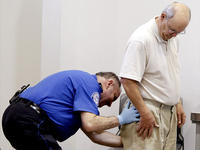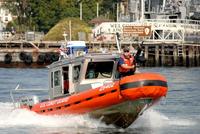-
British insurance firm building its own anti-pirate armada
With pirate attacks hitting all-time highs, a British insurance firm is creating its own fleet of gunships to help prevent these costly disruptions; in the first quarter of 2011 pirate attacks reached record highs with 142 incidents occurring; to combat this growing threat, Jardine Lloyd Thompson, which insures roughly 15 percent of the world’s maritime cargo ships, is launching its Convoy Escort Program (CEP), which consists of a fleet of eighteen gunboats; so far no country has agreed to allow the private firm to carry out its plans and it lacks the ability to operate legally; the firm has already raised all the funds necessary and could be ready to begin escorting ships as early as this year
-
-
TSA launches smartphone app to make travelling easier
To help make a passenger’s airport experience more pleasant and to minimize delays at checkpoints, the Transportation Security Administration (TSA) recently launched its MyTSA smartphone app; the app will provide travelers with official answers to the most commonly asked questions regarding security procedures at airport checkpoints; it also allows users to determine what they can or cannot bring, see airport delays in real-time, and estimate how long waits are at checkpoints; it is currently available for free on the Apple iPhone
-
-
Critical safety and security flaws in airplane maintenance outsourcing
A recent study found that airlines outsourcing their maintenance work could prove to be a major security gap and result in unreliable planes; the Transport Workers Union found that when major U.S. airlines outsource their work they have little training, oversight, or safety measures in place to ensure that the workers they hire perform quality work and do not pose a security threat; at least one member of al-Qaeda has been found working in a major maintenance facility in Singapore in 2003; the lack of training and certification could also result in shoddy airplane repair work; there are only 100 FAA inspectors for over 700 overseas maintenance facilities
-
-
Wyoming soon to get quieter railroad crossings
Residents living near railroad crossings in Wyoming will soon be getting a break from the noise; this summer the Wyoming Department of Transportation (WYDOT) will begin analyzing the state’s noisiest crossings to determine what is needed to make these areas quieter; lawmakers appropriated $5 million to fund the improvements and local communities would be required to match anywhere from 5 to 50 percent of the project costs
-
-
TSA will provide a tracking number for those calling to report suspicious activity
Air travelers who call the TSA Contact Center (TCC) to report suspicious activity will now receive a tracking number as confirmation of their phone call or e-mail; the tracking number, which enables both TSA and the individual to follow-up on their security concerns if necessary,
-
-
Cancer survivor fights TSA after pat down ruptures urine bag

After receiving a particularly rough pat down at an airport security checkpoint by a Transportation Security Administration (TSA) screener, a Michigan man with a lingering medical condition is still upset about what he perceives as a lack of progress in properly screening individuals with special health needs; TSA officials met with the man after an aggressive pat down caused his urostomy bag to rupture, spilling its contents all over his shirt and pants; three months after the meeting, the man has seen no follow through on any of the issues that were discussed and he is beginning to feel a bit disheartened
-
-
Anti high-seas piracy coalition launches public campaign
“2,000 Somali pirates are hijacking the world’s economy” — this is the motto of a new coalition of maritime transportation organization which has launched a public campaign to encourage governments to take more active measures to tackle high-seas piracy; the Save Our Seafarers campaign has a Web site and will take out ads in leading world newspapers
-
-
Randomizing Boston Harbor security patrols

Typically, before attacking a target facility, terrorists (and criminals) watch the facility’s security routines: how often, for example, the guards patrol what section of the fence; for the facility under threat, such routines are dangerous, because they let the would-be attackers learn about gaps in security coverage, gaps than can be exploited in the attacks; USC researchers have developed a system of randomized security patrols that make it impossible for observers to predict the security patterns; LAX is already using the system, and now the Coast Guard is testing it in Boston Harbor
-
-
Sector Report for Thursday, 14 April 2011: Transportation Security
This report contains the following stories.
-
-
Airline crews to get separate TSA screening process
The Transportation Security Administration (TSA) recently announced that it will begin a pilot program that tests a new separate screening process for airline pilots and flight attendants; to expedite airport security lines, airline pilots and flight attendants would not have to go through the same lines as passengers; the specifics of the system are currently in development, but TSA officials say that they are exploring the use of biometric retina scans or fingerprint matches to verify an individual’s identity against airline employee databases; many pilots objected to TSA’s increased search procedures believing that they were a nuisance and entirely unnecessary as they already have full control over the plane
-
-
GAO: TSA's behavior screening program has no scientific proof that it works
Last week a Government Accountability Office (GAO) official testified before Congress stating that the Transportation Security Administration’s (TSA) behavioral analysis program contained critical flaws; the Screening of Passengers by Observation Techniques (SPOT) program was designed to identify potential attackers by analyzing an individual’s behavior; individuals involved in six terrorist plots have slipped by behavior detection officers (BDOs) unnoticed at least twenty-three times at airports where SPOT was implemented; currently there is no scientific evidence that proves potential terrorists can be identified by behavior alone; GAO recommends freezing the SPOT program’s budget at current levels to save an estimated $20 million each year until scientific evidence for the program is established
-
-
Rail, chemical companies recognized for safety measures
TRANSCAER (Transportation Community Awareness and Emergency Response) companies train local emergency responders through a combination of hands-on activities, emergency planning assistance, and community drills and exercises, including the use of actual rail and truck equipment, table-top exercises that discuss responses to a possible emergency situation, and whistle-stop tours that bring emergency preparedness training to response organizations in communities across the country
-
-
Airports personnel don't report suspicions, mistrust technology
An in-depth study of the behavior of security personnel at European air terminals, finds that only 23.6 percent of airport employees and 58 percent of security workers said that they alerted others when they saw something suspicious — and that 54.3 percent of the workers and 40 percent of security personal never raised the alarm or called a security code; only 53.1 percent of airport employees and 63 percent of security workers said they put complete trust in security technologies
-
-
Tighter security rules keep suspects from flying
Following the 2009 Christmas Day bombing attempt, security rules were tightened on U.S.-bound flights; these rules now prevent not only known terrorists from boarding such flights, but also those who received weapons training, recruited others, fought against American troops, or help finance terrorist organizations; since the end of 2009, more than 350 people were prevented from boarding U.S.-bound flights
-
-
Inviting terror targets in New York City poorly guarded
A list of Port Authority facilities especially vulnerable to terrorist attacks inadvertently released; the list contains some of the most heavily trafficked bridges, tunnels, and transit hubs in the world
-
More headlines
The long view
New Technology is Keeping the Skies Safe
DHS S&T Baggage, Cargo, and People Screening (BCP) Program develops state-of-the-art screening solutions to help secure airspace, communities, and borders
